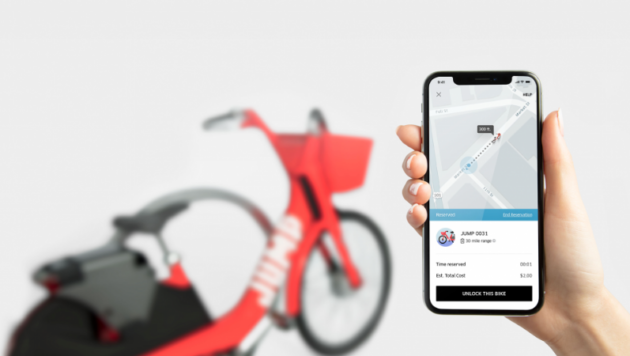

Uber is acquiring JUMP, a dockless, electric bike share startup. (Uber Photo)
Uber is expanding further into the competitive dockless bike-sharing space with the acquisition of JUMP.
JUMP CEO Ryan Rzepecki announced his electric bike-sharing startup will join Uber but retain its distinct brand in a blog post Monday. Terms of the deal were not disclosed but a source told TechCrunch the final acquisition price was around $200 million.
In January, Uber and JUMP partnered on a bike-sharing pilot program in San Francisco. Together they rolled out 250 electric-assist JUMP bikes that participants in the pilot could find and rent using the Uber app.
The acquisition shows Uber’s ambitions to move beyond a ride-hailing company to a multimodal transportation provider.
“We’re committed to bringing together multiple modes of transportation within the Uber app — so that you can choose the fastest or most affordable way to get where you’re going, whether that’s in an Uber, on a bike, on the subway, or more,” Uber CEO Dara Khosrowshahi said in a blog post.
Rzepecki was skeptical about Uber when discussions began because the company had been bogged down by scandal.
“We expected to find a toxic work environment and a broken culture,” Rzepecki said in the blog post announcing the acquisition. “Instead, everyone we met was smart, passionate, and genuinely wanted to help our team succeed.”
Rzepecki also said that the shifting company culture under Khosrowshahi, who took over last summer, inspired confidence in the JUMP team.
JUMP manufactures and operates electric assist bicycles that can be picked up and dropped off throughout cities without docking stations. The company is headquartered in New York City and operates bikes in San Francisco and Washington, D.C. JUMP plans to expand to Sacramento, Calif., Providence, Rhode Island, and other cities over the next year.
Uber is wading into a crowded space with the acquisition of JUMP. Dockless bike-sharing is having a moment in the U.S., with companies like LimeBike and Spin expanding rapidly across the country.
“Over the last two years, the bike-share industry shifted from a slow-moving government contracting business to one of the most well-capitalized and competitive consumer technologies in the world,” Rzepecki said in the blog post.
Many investors and transit wonks are bullish about dockless bike-sharing as an environmentally friendly way to reduce congestion in crowded cities but there are some indicators that the market could become oversaturated.
